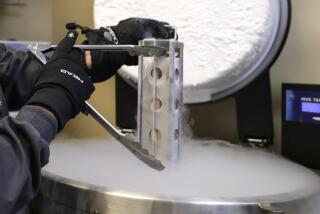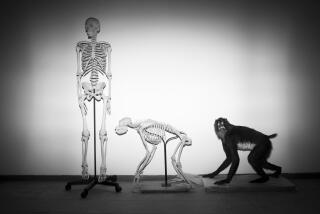Biologist Richard Dawkins on the evolution debate
In the 150 years since the publication of Charles Darwin’s landmark book, “On the Origin of Species,” researchers have accrued massive amounts of evidence in support of evolution and the mechanics behind the process. Yet today only 4 in 10 Americans believe that evolution occurred.
British evolutionary biologist Richard Dawkins, an eminent scholar and outspoken atheist, has for decades written best-selling books on evolutionary processes and has repeatedly called for rational public thinking on the matter. In his latest book, “The Greatest Show on Earth: The Evidence for Evolution” (Free Press, 2009), he provides an illustrated primer on how it all works. (For The Times book review, go here.)
Dawkins’ deep admiration and reverence for scientific processes are evident. He covers the gamut: the power that lies in biology, the delicacy and perfection of natural selection, how everything once lived in the sea, and why Darwin loved orchids.
In a rapid round of questions, Dawkins talked about the book and the ongoing argument about evolution.
Unlike your previous book “The God Delusion,” which argues that belief in a personal god is not only incorrect but irrational, your latest seems to be more of an educational text -- providing proof and explaining scientific processes. Was that your aim?
Yes, that was my intention. But it is not a textbook. It’s a book for lay people.
Throughout the book, you seem to have a deep respect, almost a love, as if you are in awe of the process. Is evolution your religion?
Well, I don’t want to say that. I quite like how you say I am in awe of the process though.
As biology and biological processes go, would you say that life is complicated or a simple process?
Life is very complicated. But the process that gives rise to it is very simple.
In the preface, you explain that evidence for evolution grows by the day and has never been stronger. What recent evidence do you believe has been the strongest?
I think probably evidence from molecular genetics which is pretty recent. I describe the very excellent work of Richard Lenski at Michigan State on bacterial evolution.
[Lenski’s long-term experiment, underway since 1988, has tracked the genetic changes that have evolved in 12 populations of originally identical E. coli bacteria.]
In the first chapter, you draw an analogy between history teachers trying to teach about World War II and the Holocaust and getting derailed by Holocaust deniers. You say science teachers today face the same situation with groups that don’t want them to teach evolution. Do you think this is uniquely an American problem?
No. I don’t. It’s a problem in Britain as well. In Britain, I think it is because of the growing Islamic population in schools. It’s a problem in some other European countries; I’ve heard rather unpleasant stories from the Netherlands and Belgium.
How can science teachers persevere in teaching the topic of evolution?
It’s very difficult for them and I sympathize with them. They need a certain amount of courage. I’d like to help in any way I can.
You write: “It’s plain truth that we are cousins of chimpanzees, somewhat more distant cousins of monkeys, more distant cousins still of aardvarks and manatees, yet more distant cousins of bananas and turnips.” Do you think that is what is hard for humans to accept -- that I am related to things lesser than me?
Yes. I think that it is difficult. It is somewhat arrogant to say things “lesser than me.” Though in Victorian times, apes and monkeys were considered comic characters, not cousins.
You describe breeding and conditioning the gene pool for certain outcomes. In our lifetime, do you think we’ll begin to see humans shape the clay of our own genetics? Bioengineering for a master race?
I doubt it. We could have done this any time in the last thousand years. As we made greyhounds and bulldogs and roses and so on. We could have done that for humans. Why would we start doing bioengineering on them now?
What is the least known or most misunderstood fact about evolution out there?
That it is a matter or chance. That it’s unguided. People believe the only alternative to randomness is intelligent design.
Do you think evolution is the most important science lesson for people to understand?
I do think there’s a lot to be said for that. It’s exciting and relatively easy to understand.
If everyone, everywhere finally digested evolution correctly, do you think that the world would be a better place?
I think the world’s always a better place if people are filled with understanding.
You mention intelligent pastors, preachers, and religious leaders who say they know that Adam and Eve never really existed. Can you talk about that a bit?
Yes, they are quite clear: Of course they don’t believe in Adam and Eve! And they know that it is figurative. But many of their congregations take their sermons literally.
If there was one thing you’d want to get across to the scientific community about this book and evolution, what is it?
I think: Stop calling it a theory -- that confuses people. Start calling it a fact.
More to Read
Start your day right
Sign up for Essential California for news, features and recommendations from the L.A. Times and beyond in your inbox six days a week.
You may occasionally receive promotional content from the Los Angeles Times.






